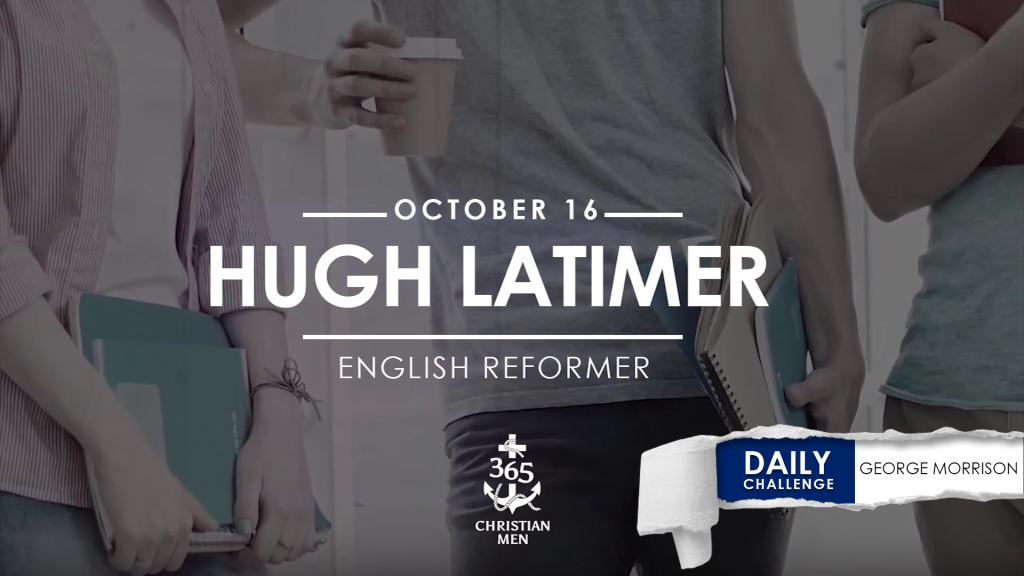October 16. Hugh Latimer. One of Latimer’s earliest memories was of when he was four. He remembered buckling his father’s armor before he went into battle. When Latimer was fourteen, he attended Cambridge University and became “ … a scrupulously observant Catholic priest.” He strongly opposed Martin Luther and the Reformation. And he was a popular preacher; he became chaplain to King Edward VI. But about himself, he said, “I was as obstinate a papist as any was in England.”
Then he met Thomas Bilney. They walked and talked, in fact they walked so much and so publicly, that the place they walked became known as “Heretics Hill.” At the White Horse Tavern, Latimer regularly met with men who held a reformed view of the church. Because so much Lutheran was talked there, the pub became known as “Little Germany.”
On this date in history in 1555 under the Catholic Queen Mary, with a comrade named Ridley, Latimer was burned at the stake for opposing Catholicism. As the fire blazed, Latimer said, “Be of good comfort Master Ridley, and play the man: we shall this day light such a candle by God’s grace in England, as I trust shall never be put out.”
In Christ, even the weakest man is strong.
Latimer was devoted to school, to scholarship, and to his Church. He was a man of wit and stature, around thirty-years old, and admired by all at the University of Cambridge. Even his name had a certain celebrity ring to it.
But there was one thing Latimer was not. He was not part of the circle of believers at Cambridge, who had placed their faith in Christ alone. Some were scholars, and a few were faculty members, but in the eyes of Latimer the believers were weak and misguided heretics in need of repentance.
The believers met regularly to search the Scriptures. And Hugh sometimes joined them just to debate with them and to urge them to abandon their misguided notions. He even insulted Master Stafford, a professor, and encouraged the youth at the school to abandon the professor’s teachings.
Some people said Latimer was like Saul before he became the Apostle Paul—zealous for the laws and ordinances of the Church, but rallying against evangelical believers.
The leader of the group of believers was Thomas Bilney, a sickly-looking fellow, Latimer thought Bilney might be an easy target to defeat. But Bilney was a prayer warrior who got onto his knees and conquered men.
Bilney found a way to share his faith in Christ and make Latimer his captive audience. He asked Latimer to hear his private confessions.
Latimer assumed the straying prodigal was finally coming to his senses. Yes, of course he would hear the man’s confessions. All of his friends would give up their folly, as well, Latimer surmised.
But in private confession, Bilney shared how he had come to faith in Christ. He shared how he could not find the forgiveness he had sought by keeping the laws and precepts of the church. He had in fact, found no peace until he believed “Jesus Christ is the Lamb of God that taketh away the sin of the world.”
Latimer sat—dumbfounded. This is not what he had expected to hear. These were not the vain ramblings of a heretic. In fact, Latimer could feel his heart opening to the strange, new witness of the Holy Ghost speaking to him. Suddenly he was struck by the war he had waged against God, and he began to cry out loud.
Bilney tried to comfort him, “Brother, though thy sins be as scarlet, they shall be white as snow.”
But Latimer was overwhelmed by the love of God in Christ, and he yielded to the truth and cast himself upon the Savior. The priest became the penitent! It was a miracle of God’s grace.
Latimer said afterward, “I learnt more by this confession than in many years before. From that time forward I began to smell the Word of God, and forsook the doctors of the schools and such fooleries.” He was a changed man.
The Bible promises: “For it is by grace you have been saved, through faith—and this is not from yourselves, it is the gift of God—not by works, so that no one can boast” (Ephesians 2:8–9, NIV).
In Christ, even the weakest man is strong. The power of your testimony can set a person free. Be bold.
Merle d’Aubigne’, J.H. The Reformation in England. Carlisle, PA: The Banner of Truth Trust, 1853.
Cairns, Earle E. Christianity Through the Centuries, A History of the Christian Church. p. 360. Grand Rapids, MI: Zondervan Publishing House, 1954.
“Bishops Ridley and Latimer Burned.” Christianity.com. May 3, 2010. https://www.christianity.com/church/church-history/timeline/1501–1600/bishops-ridley-and-latimer-burned-11629990. html.
Hubbard, Scott. “The British Candle: Latimer and Ridley.” Accessed July 18, 2020. https://www.desiringgod.org/articles/the-british-candle.
Cavendish, Richard. “Latimer and Ridley, Burned at the Stake.” History Today. October 10, 2005. https://www.historytoday.com/richard-cavendish/latimer-and-ridley-burned-stake.
Foxe, John. Foxe’s Book of Martyrs. “Hugh Latimer.” London: Frederick Warne and Co., 1869.
Story read by: Daniel Carpenter
Introduction read by: Daniel Carpenter
Audio production: Joel Carpenter
Editor: Teresa Crumpton, https://authorspark.org/
Project manager: Blake Mattocks
© 2020, 365 Christian Men. LLC. All rights reserved.





